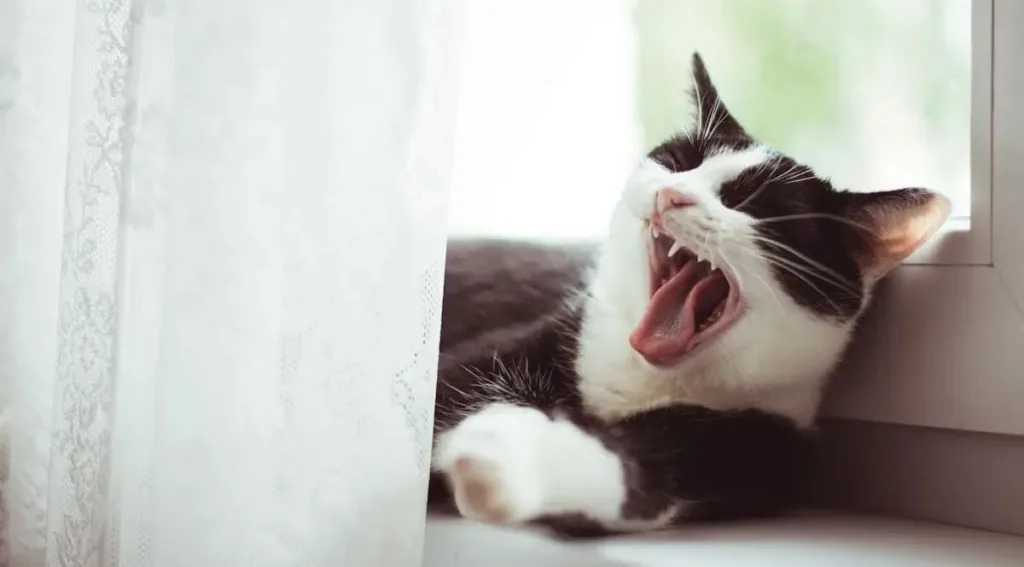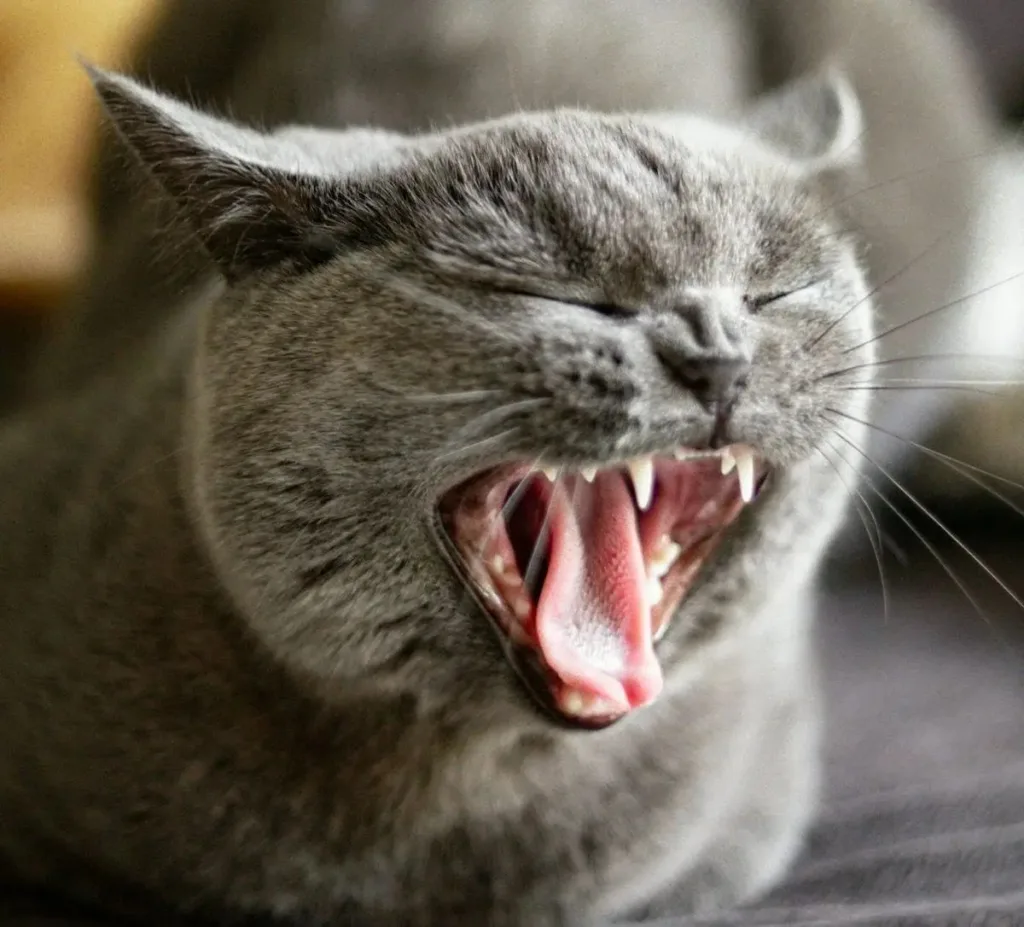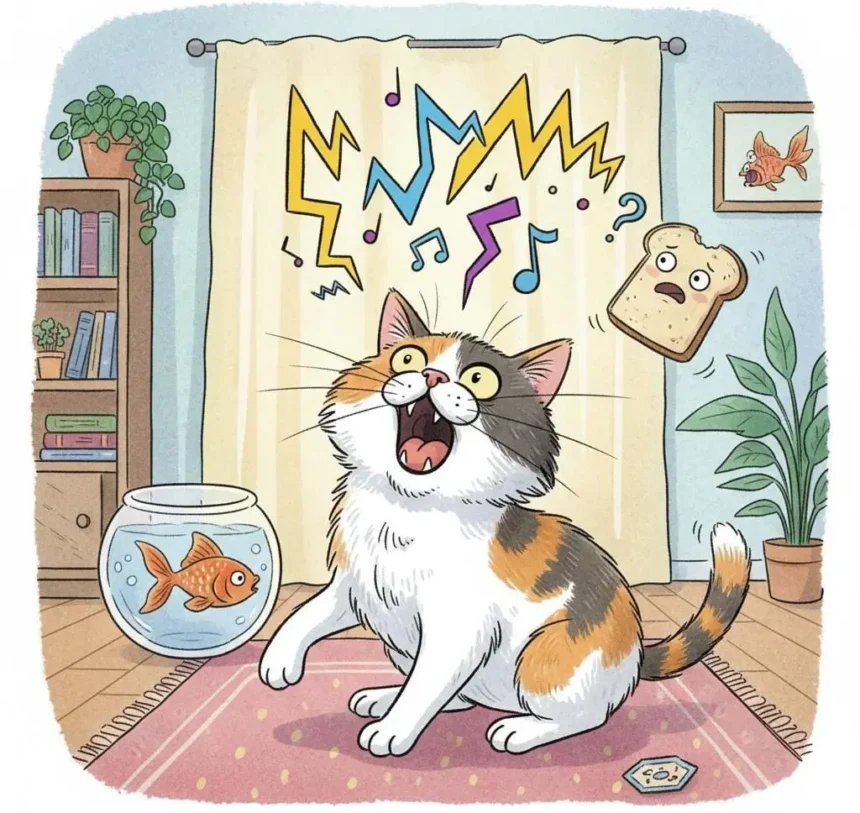As a cat parent, it can be both confusing and worrying when your feline starts making weird cat noises—from strange cat sounds at night like eerie yowls, to chirping, chattering, or growling during the day. These unexpected feline vocalizations often leave owners asking: Why is my cat making weird noises? The truth is, cats use a wide range of sounds to communicate emotions, needs, or even health concerns. Understanding the meanings behind cat noises—whether it’s a simple meow for attention, a chatter at the window, or a yowl signaling distress—can help you strengthen your bond, spot potential medical issues early, and create a calmer home environment.
The Basics of Cat Communication: Why Do Cats Make Noises at All?

Cats are subtle communicators, relying heavily on body language, but their vocal repertoire is vast, with over 16 distinct sounds according to veterinary research. Unlike their wild ancestors, who stayed silent to stalk prey, domesticated cats evolved vocalizations primarily for humans, mimicking kitten-to-mother mews to bond with us. These feline vocalizations express emotions like joy, frustration, or pain, influenced by age, breed, health, and environment. Cat weird noises at night often spike due to their crepuscular (dawn/dusk) instincts. To decode them, track patterns: when, where, and how your cat vocalizes, alongside body language like ear position or tail flicks. Below, we list common strange cat sounds before diving into detailed explanations.
List of Weird Cat Noises and Their Meanings
This quick-reference list summarizes the most common strange cat sounds, their typical causes, and when to worry, offering a clear starting point before our in-depth analysis.
- High-Pitched/Yelping Meow: Sharp, alarm-like squeal. Meaning: Pain, surprise, or distress (e.g., stepped-on tail). When to Worry: Frequent with limping or hiding—check for injuries or dental issues.
- Low-Pitched/Drawn-Out Meow: Grumpy, prolonged “meooowww.” Meaning: Complaint or mild discomfort (e.g., empty bowl). When to Worry: Persistent in multi-cat homes may signal territorial stress.
- Rapid/Repeated Meows: Machine-gun-like bursts. Meaning: Excitement or urgency (e.g., playtime anticipation). When to Worry: Excessive in older cats could indicate hyperthyroidism.
- Purring with Tension: Rumble with stiff posture. Meaning: Self-soothing during stress or pain, not just contentment. When to Worry: Paired with dilated pupils or hiding—vet check needed.
- Chirping/Trilling: Bird-like warbles or rolling sounds. Meaning: Excitement or greeting (e.g., spotting toys). When to Worry: Overuse in high-energy breeds like Bengals may signal anxiety.
- Chattering/Twittering: Teeth-clacking with chirps. Meaning: Hunting frustration (e.g., watching birds). When to Worry: Excessive at night suggests unmet exercise needs.
- Growling/Hissing: Low rumbles or sizzles. Meaning: Fear or aggression (e.g., new pet encounters). When to Worry: Chronic hissing may point to hyperesthesia syndrome.
- Spitting: Explosive mini-snarl. Meaning: Immediate threat response (e.g., sudden scares). When to Worry: Paired with aggression could indicate serious stress or rare conditions like rabies.
- Yowling/Caterwauling: Long, mournful howls. Meaning: Territorial, mating, or loneliness cries. When to Worry: Sudden onset in seniors may signal cognitive dysfunction syndrome (CDS).
- Wheezing/Coughing Sounds: Raspy or labored noises. Meaning: Respiratory issues or allergies. When to Worry: Persistent or with lethargy—urgent vet visit required.
Detailed Breakdown of Strange Cat Noises
1. Meowing Variations: From Demands to Distress Calls
Meowing is the cornerstone of feline vocalizations, primarily directed at humans rather than other cats.
- Standard or Short Meow: A mid-pitched “mew” or “hello” meow, often a greeting or request for food/attention. Explanation: Mimics kitten calls to bond with humans. Causes: Routine check-ins, like welcoming you home. When to Worry: Incessant meowing in senior cats may indicate cognitive dysfunction syndrome (CDS), where confusion or hearing loss increases vocalization. Tips: Respond promptly to reinforce trust; for seniors, use nightlights to reduce disorientation.
- High-Pitched or Yelping Meow: A sharp, piercing squeal signaling pain or surprise. Explanation: An evolved distress call for immediate attention. Causes: Minor accidents like stepping on a toy or sudden noises. When to Worry: Frequent yelps with limping or hiding may point to arthritis or dental pain, often overlooked. Tips: Cat-proof your home; schedule annual dental exams.
- Low-Pitched or Drawn-Out Meow: A deep, grumpy “meooowww” expressing dissatisfaction. Explanation: Conveys frustration, less urgent than high-pitched meows. Causes: Hunger, boredom, or mild discomfort. When to Worry: Persistent in multi-cat homes could indicate territorial stress. Tips: Puzzle feeders alleviate boredom.
- Repeated or Rapid Meows: Rapid-fire bursts signaling excitement or urgency. Explanation: Intensifies to grab attention quickly. Causes: Anticipation of play or meals. When to Worry: Excessive repetition in middle-aged cats may suggest hyperthyroidism. Tips: Evening play sessions reduce energy bursts.
2. Purring: Not Always a Happy Sound
Purring is iconic but complex, not always signaling bliss.
- Explanation: Created by vibrating laryngeal muscles, purring aids healing through low-frequency vibrations. Causes: Contentment during petting, but also self-soothing in pain or fear. When to Worry: Purring with tense posture (dilated pupils, flattened ears) indicates distress. Tips: Check body language; consult vets for unprompted purring in sick cats.
3. Chirping, Trilling, and Chattering: The Hunter’s Playlist
These bird-like strange cat sounds stem from predatory instincts.
- Chirping/Trilling: High-pitched, melodic warbles like a greeting or excitement burst. Explanation: Mother cats trill to kittens; adults use it for positive human/cat interactions. Causes: Spotting toys or loved ones. When to Worry: Excessive trilling in high-energy breeds like Bengals may signal anxiety. Tips: Interactive lasers satisfy hunting urges.
- Chattering/Twittering: Teeth-clacking with chirps, often at windows. Explanation: Frustration from “almost” catching prey, possibly mimicking prey calls. Causes: Watching birds at dawn. When to Worry: Nighttime excess suggests unmet exercise needs. Tips: Window perches with toys redirect energy.
4. Growling, Hissing, and Spitting: The Warning Trio
These defensive feline vocalizations signal discomfort or threat.
- Growling/Hissing: Low rumbles or sizzles with arched backs. Explanation: Involuntary fear responses escalating to aggression. Causes: New pets, vet visits, or pain. When to Worry: Chronic hissing may indicate hyperesthesia syndrome (skin sensitivity). Tips: Pheromone diffusers calm nerves.
- Spitting: Explosive, short bursts like a mini-snarl. Explanation: A heightened hiss for imminent threats. Causes: Sudden scares like loud noises. When to Worry: Paired with aggression could signal serious stress or rare conditions like rabies. Tips: Gradual introductions to new stimuli.
5. Yowling and Caterwauling: The Eerie Nighttime Howls
These haunting moans are prime cat weird noises at night.
- Explanation: Territorial or mating calls, louder in intact cats. Causes: Heat cycles, loneliness, or CDS in seniors. When to Worry: Sudden yowling in older cats may signal dementia. Tips: Spay/neuter early; white noise machines mask triggers.
Why Do Weird Noises Spike at Night?

Cats’ crepuscular nature drives 70% of nocturnal strange cat sounds, peaking at twilight when prey is active. Dream-induced groans or sniffles during REM sleep mimic hunting, while loneliness amplifies yowls. Multi-cat homes increase hissing due to competition; urban noise pollution heightens stress yowls, often ignored in guides.
Medical and Breed-Specific Causes: Addressing Overlooked Factors
Weird cat noises can signal health issues like respiratory infections (wheezy coughs), allergies (sniffly meows), or hyperthyroidism (excessive vocalizing). Breed-specific quirks are under-discussed: Siamese cats have raspy, talkative meows due to vocal cord structure; Persians may wheeze from flat faces. Senior cats with CDS yowl from confusion, a gap in age-focused discussions. Regular thyroid screenings catch vocal shifts early.
When to See a Vet: Red Flags for Strange Cat Sounds
Sudden or persistent changes demand attention. Watch for: new noises with appetite loss, lethargy, or limping. Record audio for vets to catch subtle patterns. Early intervention prevents escalation of issues like dental disease or neurological conditions.
Prevention Tips: Quieting the Feline Symphony
- Consistent Routine: Fixed feeding, play, and sleep schedules reduce demand-driven meows.
- Environmental Enrichment: Toys, scratching posts, and perches satisfy instincts, curbing chatters.
- Health Maintenance: Annual checkups, vaccinations, and spaying/neutering prevent medical triggers.
- Stress Reduction: Calming collars or pheromone diffusers ease multi-pet tensions.
- Nighttime Solutions: Blackout curtains, bedtime play, or separate sleeping areas minimize nocturnal yowls.
Conclusion: Tuning Into Your Cat’s Unique Voice
Why is my cat making weird noises? Often, it’s your cat’s way of chatting—expressing joy, hunting instincts, or a plea for attention. By understanding these feline vocalizations explained through our detailed list and analysis, you’ll strengthen your bond and catch health issues early. Every cat’s “weird” is unique; observe holistically. If the noises turn concerning, a vet visit restores harmony. Here’s to fewer 3 a.m. yowls and a happier, healthier cat!
Faq:
Q1: Why is my cat making weird noises at night?
Cats are crepuscular and most active at dawn and dusk. Noises at night may signal hunting instincts, loneliness, or health issues like hyperthyroidism or cognitive decline in seniors.
Q2: What does it mean when my cat chirps or chatters?
Chirping or chattering usually indicates hunting frustration or excitement, often when a cat sees birds or prey outside.
Q3: Should I worry if my cat growls or hisses often?
Occasional hissing or growling is normal when a cat feels threatened. Frequent episodes may indicate stress, territorial conflict, or pain that requires a vet check.
Q4: Can weird cat noises mean my cat is sick?
Yes. Persistent coughing, wheezing, or sudden vocal changes may signal respiratory illness, dental pain, or thyroid issues. A vet visit is recommended.
Q5: Do certain cat breeds make more unusual sounds?
Yes. Siamese cats are famously vocal with raspy meows, while Bengals trill and chirp more often. Breed traits influence vocal habits.

